JFK's Very Revealing Harvard Application Essay
At 17 years old, the future president seemed to understand that the value of an elite education is in the status it offers.
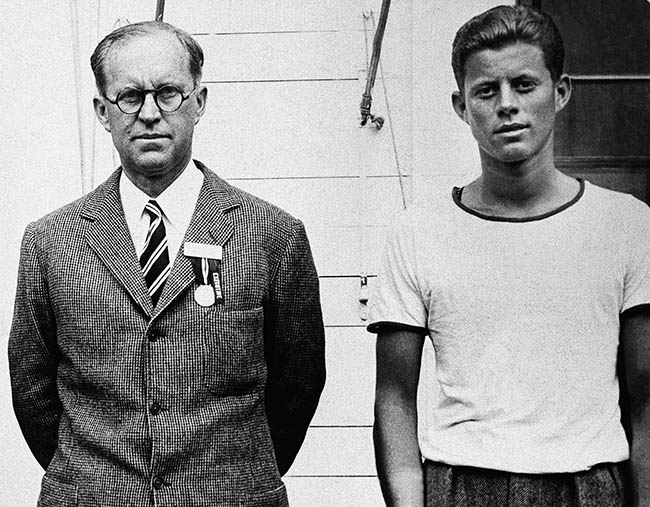
John F. Kennedy is one of the most mythologized figures in contemporary American history. At age 17, though, he was just a kid trying to get into college (a kid with a wealthy, famous father, of course).
The Kennedy Presidential Library and Museum has a digitized version of Kennedy's 1935 Harvard application, which includes his grades and his response to the essay prompt, "Why do you wish to come to Harvard?" Here's how the future president answered:
The reasons that I have for wishing to go to Harvard are several. I feel that Harvard can give me a better background and a better liberal education than any other university. I have always wanted to go there, as I have felt that it is not just another college , but is a university with something definite to offer. Then too, I would like to go to the same college as my father. To be a "Harvard man" is an enviable distinction, and one that I sincerely hope I shall attain. April 23, 1935 John F. Kennedy
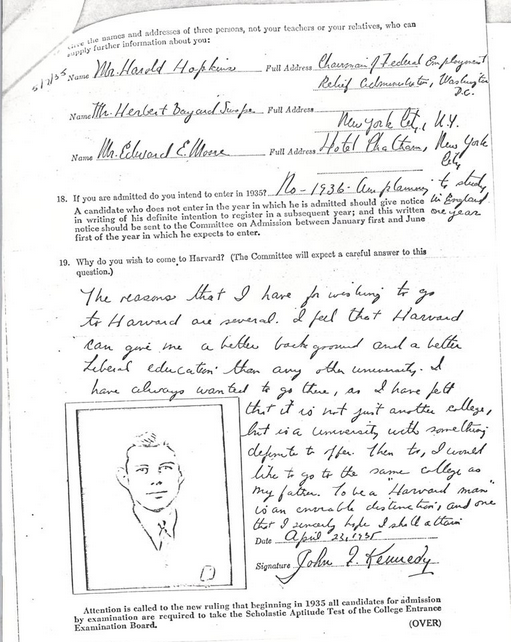
Business Insider dismisses the essay for being five sentences long (I'm not sure how much more he could have written given the space) and implies that his answer wasn't carefully considered. That's probably true—Kennedy's grades show that he wasn't an especially good student in high school, and there's not much evidence that he took his education seriously at this point in his life. Plus, as Gawker points out , Kennedy wrote nearly exactly the same essay for his Princeton application.
Still, Kennedy's essay shows a profound, if implicit, understanding of the primary value of attending an elite school: status and personal connections, rather than mastery of academic skills and knowledge. Notice that he only makes one mention of the education he'd receive at Harvard—a passing reference to the school's superior "liberal education." The rest of the paragraph focuses on the the non-academic benefits: having a "better background," sharing the same alma mater with his dad, and enjoying the "enviable distinction" of being a Harvard Man.
And it is, indeed, an enviable distinction. Harvard has produced eight United States presidents, more than any other school. The school's website has a whole section devoted to all the alumni who've won Nobel prizes. Two of its dropouts are among the richest people in America. Whether these glories are due to the school's excellent education or its impressive alumni network and name recognition, who knows? But Kennedy clearly thought he knew the answer.
- Weird But True
- Sex & Relationships
- Viral Trends
- Human Interest
- Fashion & Beauty
- Food & Drink

trending now in Lifestyle

Plastic surgeons warn 'Ozempic face' has taken over Hollywood

I'm a cancer dietitian — these two things increase cancer risk

We made a freaky discovery while cleaning the toilet in our...

Ozempic use appears to be changing people's personalities...

I'm 61 but have the body of a 38-year-old — here's how I...

Bird flu virus now found in milk, is of “great concern” to WHO

Cronut creator Dominique Ansel has come up with the craziest...

Why a 'situationship' like Taylor Swift’s with Matty Healy is...
John f. kennedy’s harvard entrance essay resurfaces online 87 years later.
- View Author Archive
- Get author RSS feed
Thanks for contacting us. We've received your submission.

It’s no “Ask not… ” speech, that’s for sure.
John F. Kennedy’s college admissions letter to Harvard University has resurfaced on social media some 87 years later, and the Twitterati are hardly impressed with the iconic 35th president of the United States.
The note, penned by the young White House hopeful on April 23, 1935, is currently archived at the John F. Kennedy Presidential Museum and Library in Boston, Massachusetts.
His prompt was simple — “Why do you wish to come to Harvard?” — but his answer was even simpler.
In an indisputably underwhelming statement composed of just five sentences, the 17-year-old Bay State native answered the query that would determine his educational future.
He wrote, “The reasons that I have for wishing to go to Harvard are several. I feel that Harvard can give me a better background and a better liberal education than any other university.”

He continued: “I have always wanted to go there, as I have felt that it is not just another college, but is a university with something definite to offer. Then too, I would like to go to the same college as my father. To be a ‘Harvard man’ is an enviable distinction, and one that I sincerely hope I shall attain.”
Kennedy eventually wound up at Harvard and graduated cum laude with a Bachelor of Arts in government in 1940.
“ ’Harvard is a whole vibe. And I’m tryna catch the wave. Lemme in.’ — JFK,” one reader joked . The reaction garnered more than 59,000 likes on Twitter.
"Harvard is a whole vibe. And I'm tryna catch the wave. Lemme in." – JFK — C.E. Little, Ph.D. (@ItsDrLittle) February 1, 2022
“If you want to see peak white mediocrity, here’s JFK’s Harvard admission essay,” added another.
Even the Velveeta cheese brand chimed in : “LOL OUR PRODUCT DESCRIPTION FROM OUR WEBSITE IS 28 WORDS LONGER THAN JFK’S HARVARD COLLEGE ESSAY!”
The Democrat’s short but influential term as the nation’s youngest elected president began in 1961. JFK was assassinated on Nov. 22, 1963 at the age of 46.
But his family’s academic legacy continues until this day . Jack Schlossberg, Kennedy’s grandson via daughter Caroline Kennedy, recently graduated from Harvard Law and Harvard Business School.
Schlossberg, 29, previously attended Yale University and graduated in 2015 with a degree in history with a concentration in Japanese history.
He also appeared at the 2020 Democratic National Convention where he voiced support of now-president Joe Biden and touched upon JFK’s career.
“Times have changed, but the themes of my grandfather’s speech — courage, unity and patriotism — are as important today as they were in 1960,” he said. “Once again, we need a leader who believes America’s best days are yet to come. We need Joe Biden.”
Share this article:
People are dunking on JFK's half-assed Harvard admission essay in the wake of the Supreme Court axing affirmative action
- The Supreme Court ruled to overturn race-based affirmative action on Thursday.
- After the ruling, many focused on John F. Kennedy's underwhelming 1935 Harvard admission essay.
- People painted Kennedy as a classic legacy admission — a system that exists in some form today.

In the wake of the Supreme Court's decision on affirmative action , the essay John F. Kennedy wrote in 1935 emerged online as a topic of discussion — and derision.
The essay, which was first published by The Washington Post in 2013, reappeared on social media on Thursday after the Supreme Court ruled that affirmative action in college admissions was unconstitutional.
Affirmative action — giving additional weight to applicants from disadvantaged demographics — had been upheld for four decades and helped minority groups access elite institutions like Harvard.
When Kennedy applied there, aged 17, the process was nowhere near as rigorous, with an application form just three pages long, per The Post.
Kennedy did not appear to be trying very hard to impress the school, other than name-dropping his rich father.
"The reasons that I have for wishing to go to Harvard are several. I feel that Harvard can give me a better background and a better liberal education than any other university," the essay read.
Related stories
"I have always wanted to go there, as I have felt that it is not just another college, but is a university with something definite to offer. Then too, I would like to go to the same college as my father. To be a 'Harvard man' is an enviable distinction and one that I sincerely hope I shall attain," it added. That was it.
—Rebecca Brenner Graham, PhD (@TheOtherRBG) June 29, 2023
The short essay shocked people on social media, who pointed out that the mention of Kennedy's father — a wealthy businessman who graduated from Harvard in 1912 — was most likely what got him into the Ivy League.
One person jokingly tweeted : "Getting into Harvard: 1) be a person of color in the top 20 of every student in America, with SATs and recommendation from a state senator. 2) have Robert Kennedy be your dad, write something about being a Harvard man on a cocktail napkin, and transcribe it to your application."
Although Kennedy's example was extreme and unlikely to cut muster today, US colleges do explicitly favor applicants whose parents went there, via the legacy system.
Commentators — including President Joe Biden — on Thursday noted that the legacy system remained untouched by the court ruling.
The system, they complained, left colleges unable to shape their decisions on grounds or race, but able to do so based on applicants' parents, who are likely to already be privileged thesmelves, and probably white.
Kennedy started his degree in 1936 and graduated cum laude in 1940 with a Bachelor of Arts in government. He became America's 35th president around 20 years later.
Harvard admissions have become extremely competitive in the years since Kennedy applied.
In 1935, a total of 7,870 students were admitted to Harvard, according to a Harvard Crimson article at the time.
Only 1,984 people were admitted into the class of 2026, making the admission rate just 3%, according to the Ivy League's website.
The Supreme Court's ruling on Thursday was criticized by many, including Justice Sonia Sotomayor, who argued in a dissenting opinion that it failed to understand the critical role race plays in society.
A group of Harvard University administrators said in a statement that the school would "continue to be a vibrant community whose members come from all walks of life, all over the world."
- Main content
Why Is JFK's Harvard Admissions Essay Going Viral?
Social media users are discovering President John F. Kennedy's "underwhelming" Harvard application.
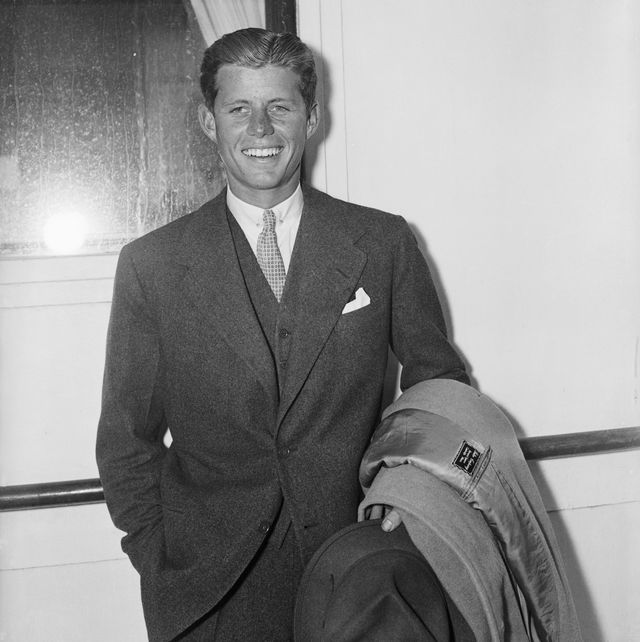
In one tweet from February 7, a UCLA PhD student tweeted JFK's Harvard application essay with a simple screenshot and the text "YALL IM CRYING PLEASE LOOK AT THIS!!!" The tweet has nearly 70,000 likes and 8,000 retweets.
Many users point out how underwhelming the essay is, others suggest that the line that got him accepted was the mention of his father, Joseph P. Kennedy Sr., who graduated from Harvard in 1912.
It reads the essay full:
The reasons that I have for wishing to go to Harvard are several. I feel that Harvard can give me a better background and a better liberal education than any other university. I have always wanted to go there, as I have felt that it is not just another college, but is a university with something definite to offer. Then too, I would like to go to the same college as my father. To be a "Harvard man" is an enviable distinction, and one that I sincerely hope I shall attain.
It's only five sentences long, and as many pointed out on Twitter, it doesn't really say much. Yet, the essay worked—he got in, started in fall of 1936, and graduated cum laude in 1940 with a Bachelor of Arts in government.
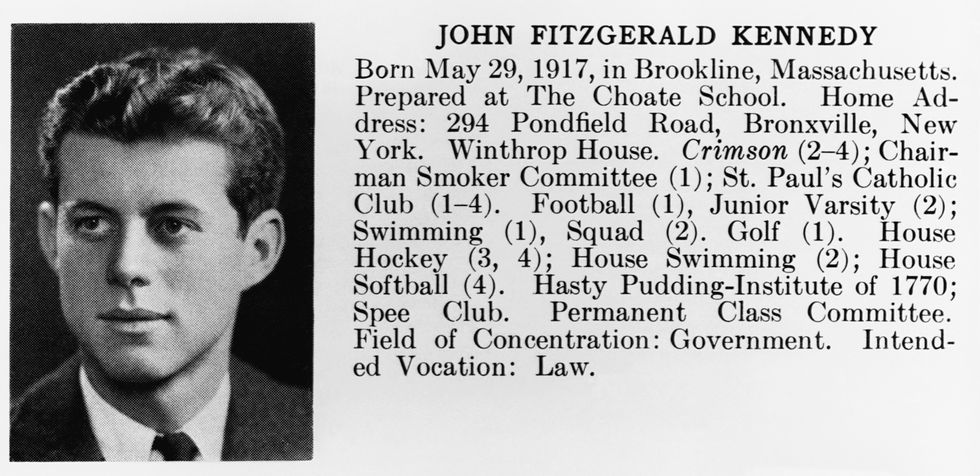
Harvard admissions has become extremely competitive in the years since JFK applied; the acceptance rate fell to 3.43 percent in 2021. Yet, according to the Harvard Crimson , "Between 2014 and 2019, the acceptance rate for legacies, 33 percent, dwarfed Harvard’s overall acceptance rate of only 6 percent."
JFK's own children and grandchildren attended Harvard: his daughter, Caroline Kennedy graduated from undergrad in 1980, and granddaughter, Rose Kennedy Schlossberg, graduated in 2010. Jack Kennedy Schlossberg didn't attend for undergrad, opting to go to Yale University instead, but he recently graduated with dual degrees from Harvard Business School and Harvard Law School.
It's not just Twitter where JFK's essay is going viral; on TikTok, law student Rashid Eldoma analyzes the essay:
Musician Jordan Kahan, who goes by Boxout, also responded to the essay on the platform joking that it "basically boils down to 'Harvard's pretty cool, also my dad went here, so let me in please."
This isn't the first time the essay has gone viral. It surfaces every few years, in part thanks to the Kennedy Presidential Library and Museum's digitized version.
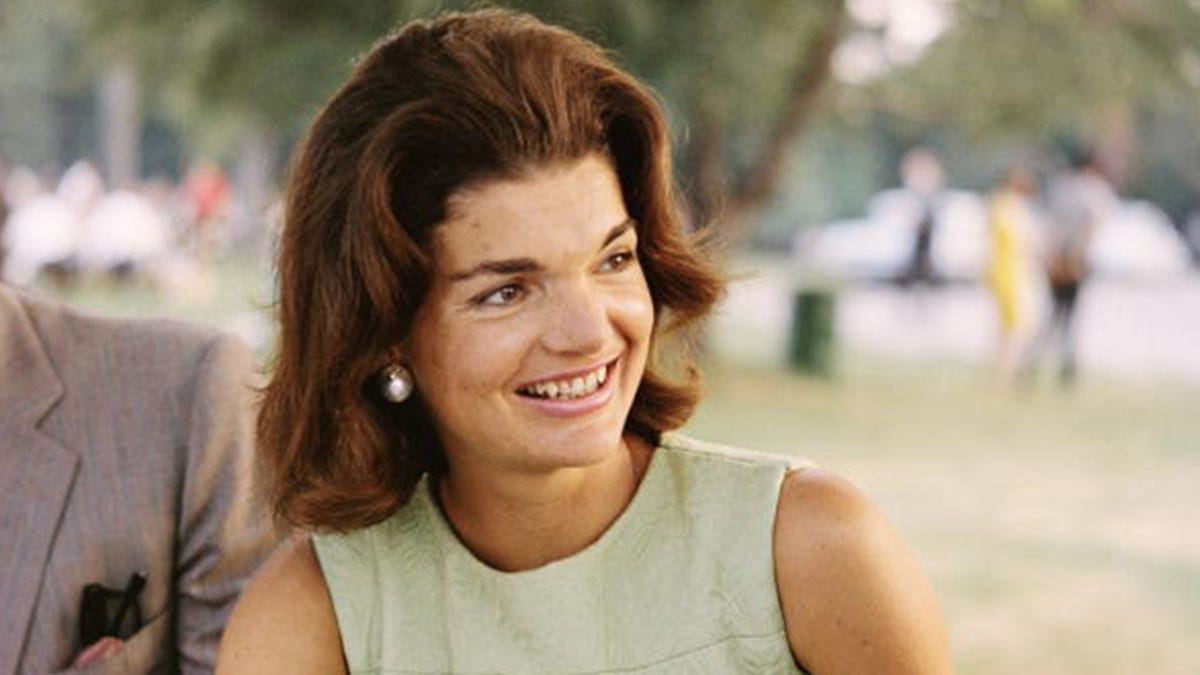
Emily Burack (she/her) is the Senior News Editor for Town & Country, where she covers entertainment, culture, the royals, and a range of other subjects. Before joining T&C, she was the deputy managing editor at Hey Alma , a Jewish culture site. Follow her @emburack on Twitter and Instagram .
@media(min-width: 40.625rem){.css-1jdielu:before{margin:0.625rem 0.625rem 0;width:3.5rem;-webkit-filter:invert(17%) sepia(72%) saturate(710%) hue-rotate(181deg) brightness(97%) contrast(97%);filter:invert(17%) sepia(72%) saturate(710%) hue-rotate(181deg) brightness(97%) contrast(97%);height:1.5rem;content:'';display:inline-block;-webkit-transform:scale(-1, 1);-moz-transform:scale(-1, 1);-ms-transform:scale(-1, 1);transform:scale(-1, 1);background-repeat:no-repeat;}.loaded .css-1jdielu:before{background-image:url(/_assets/design-tokens/townandcountrymag/static/images/diamond-header-design-element.80fb60e.svg);}}@media(min-width: 64rem){.css-1jdielu:before{margin:0 0.625rem 0.25rem;}} The Kennedy Family @media(min-width: 40.625rem){.css-128xfoy:before{margin:0.625rem 0.625rem 0;width:3.5rem;-webkit-filter:invert(17%) sepia(72%) saturate(710%) hue-rotate(181deg) brightness(97%) contrast(97%);filter:invert(17%) sepia(72%) saturate(710%) hue-rotate(181deg) brightness(97%) contrast(97%);height:1.5rem;content:'';display:inline-block;background-repeat:no-repeat;}.loaded .css-128xfoy:before{background-image:url(/_assets/design-tokens/townandcountrymag/static/images/diamond-header-design-element.80fb60e.svg);}}@media(min-width: 64rem){.css-128xfoy:before{margin:0 0.625rem 0.25rem;}}
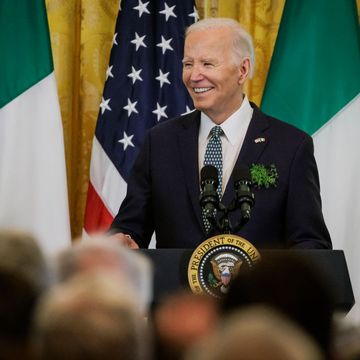
Bobby Shriver Speaks Out Against RFK Jr. Ad
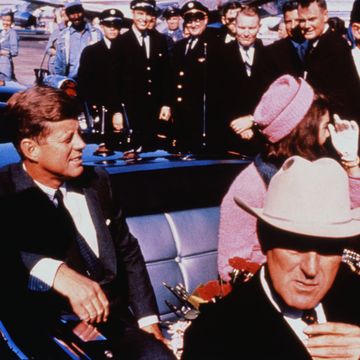
Does Rob Reiner Know Who Killed John F. Kennedy?
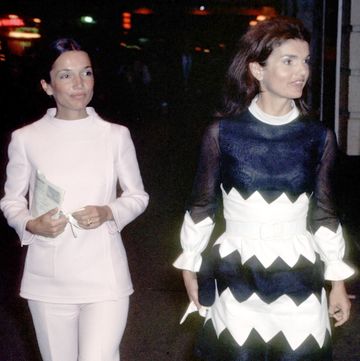
How Lee Radziwill Helped Jackie Kennedy
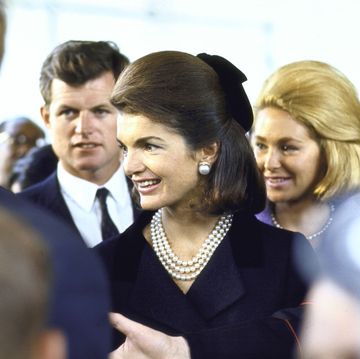
Jackie Kennedy's Life in Pictures
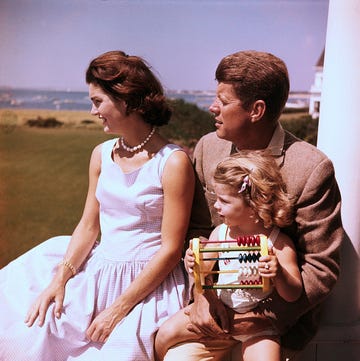
70 Powerful Photos of the Kennedy Family
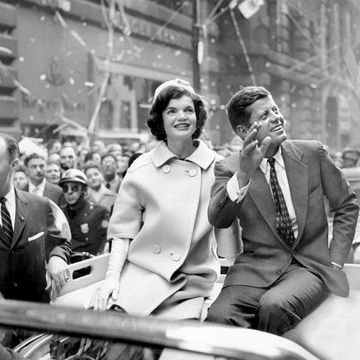
Remembering JFK: His Life in Pictures
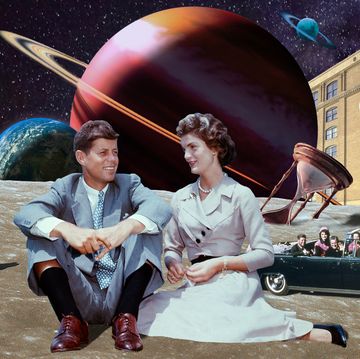
60 Years Later, We’re Still Trying to Save Kennedy
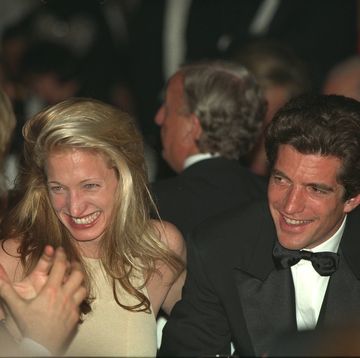
Remembering John F. Kennedy, Jr.'s Life in Photos
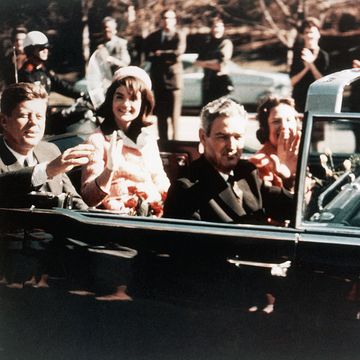
5 Enduring Kennedy Conspiracy Theories
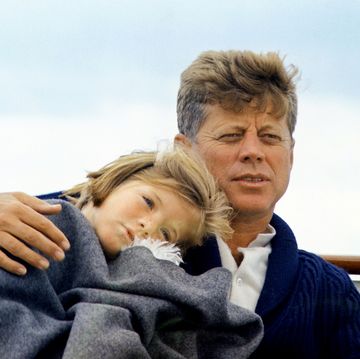
Caroline Kennedy's Life in Pictures
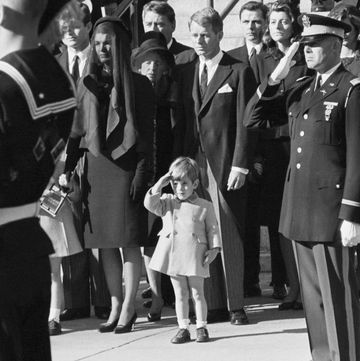
Story Behind John Jr.'s Salute at JFK's Funeral

- University News
- Faculty & Research
- Health & Medicine
- Science & Technology
- Social Sciences
- Humanities & Arts
- Students & Alumni
- Arts & Culture
- Sports & Athletics
- The Professions
- International
- New England Guide
The Magazine
- Current Issue
- Past Issues
Class Notes & Obituaries
- Browse Class Notes
- Browse Obituaries
Collections
- Commencement
- The Context
- Harvard Squared
- Harvard in the Headlines
Support Harvard Magazine
- Why We Need Your Support
- How We Are Funded
- Ways to Support the Magazine
- Special Gifts
- Behind the Scenes
Classifieds
- Vacation Rentals & Travel
- Real Estate
- Products & Services
- Harvard Authors’ Bookshelf
- Education & Enrichment Resource
- Ad Prices & Information
- Place An Ad
Follow Harvard Magazine:
http://www.businessinsider.com/personal-essay-application-jfk-get-into-harvard-2013-11 Thu, 11/21/2013 - 19:00 Business Insider Here's The 5-Sentence Personal Essay That Helped JFK Get Into Harvard
clock This article was published more than 10 years ago
JFK’s Harvard application (with essay) and other school records

The 50th anniversary of the assassination of President John F. Kennedy this Friday has prompted an avalanche of coverage about his life and death, including today’s visit to his graveside at Arlington Cemetery by President Obama and former President Bill Clinton. Here’s a look at something that hasn’t got much attention: his education.
The John F. Kennedy Presidential Library and Museum has digitized a number of records relating to his educational experience, and here are some of those documents, including his Harvard University application — in his own handwriting — as well as his grades from The Choate School and a letter from his father, Joseph Kennedy, to the Harvard admissions dean explaining that JFK was “brilliant” but “careless” and “lacks ambition” for things that didn’t interest him.
JFK went to these schools: Through fourth grade, the Edward Devotion School, Noble and and Greenough Lower School and the Dexter School in Massachusetts; Riverdale Country Day School in New York from fifth through seventh grades; the Canterbury School in Connecticut for eighth grade; The Choate School in Connecticut for high school. He attended Princeton University for no more than two months in 1935, and later enrolled and graduated from Harvard.
Take a look at his grades and his university application. You may be surprised.
PHOTOS: JFK, the man behind Camelot – A selection of the best images from his life

- Search Please fill out this field.
- Manage Your Subscription
- Give a Gift Subscription
- Newsletters
- Sweepstakes
JFK's Teenage 'Harvard Man' Entrance Essay Goes Viral on Twitter 87 Years Later
The 17-year-old future president wrote in his Harvard entrance essay, "To be a 'Harvard man' is an enviable distinction, and one that I sincerely hope I shall attain"
:max_bytes(150000):strip_icc():format(webp)/IMG_4737-8b5b28d8b0e4469cbec8fe71e041ff12.jpeg)
A 1935 Harvard University entrance essay written by a then 17-year-old John F. Kennedy is again making the rounds online, this time going viral on social media for what critics say is an underwhelming piece of writing considering the teen who wrote it would go on to be president.
The short essay — written on April 23, 1935 and now housed at the John F. Kennedy Presidential Museum and Library — was written in response to the prompt: "Why do you wish to come to Harvard?"
In his five-sentence response, Kennedy extols the benefits of being a "Harvard man" and attending the same college as his father.
"The reasons that I have for wishing to go to Harvard are several," he wrote. "I feel that Harvard can give me a better background and a better liberal education than any other university."
Kennedy continued: "I have always wanted to go there, as I have felt that it is not just another college, but is a university with something definite to offer. Then too, I would like to go to the same college as my father. To be a 'Harvard man' is an enviable distinction, and one that I sincerely hope I shall attain."
Social media users recently re-shared the essay (which periodically makes headlines ), with some reinterpreting it for 2022.
" 'Harvard is a whole vibe. And I'm tryna catch the wave. Lemme in.' - JFK," wrote one Twitter user in response to the essay.
Others noted that the entrance essay Kennedy submitted to Princeton — in which he noted the "enviable distinction" of being a "Princeton man" — was strikingly similar .
Others noted that it was a different time — one in which entrance essays weren't as important a part as the overall application — and the teenager who wrote the essay did go on to achieve some notable things: "You understand that this was 85 years ago, and that he did in fact go on to fairly high office and some acclaim, right?"
Kennedy ultimately attended Harvard, graduating with a Bachelor of Arts in government in 1940.
He again wrote of what it meant to attend the prestigious university in a 1956 article for the Harvard Alumni Bulletin titled " Why Harvard Men Go Into Politics ."
"But more important than its reputation, Harvard offers the potential politician an atmosphere conducive to the furtherances of such a career," Kennedy — then serving as a Massachusetts senator — wrote. "His interest in national affairs is quickened, and his comprehension of political issues is increased."
He continued elsewhere in the essay: "This gentle though constant pressure has resulted in Harvard men on all levels of community and national affairs contributing immensely to the improvement of our public life. I have no doubt that Harvard men will continue to utilize this splendid background by continuing to enter the political arena in large numbers. Few other professions are so demanding _ but few, I must add, are so satisfying to the heart and soul."
Also that year, Kennedy published his 1956 book Profiles in Courage — co-written by his adviser, Ted Sorensen — for which he won the Pulitzer Prize for biography in 1957.
He would be elected president in 1960 and serve until Nov. 22, 1963, when he was assassinated in Dallas.
Kennedy, then 46, was struck by two bullets while riding through the streets of Dallas in an open-topped motorcade with wife Jacqueline Kennedy by his side.
Related Articles
JFK’s Harvard essay resurfaces, to mockery, after Supreme Court strikes down affirmative action

John F. Kennedy endeavored to be a “Harvard Man,” just like his father.
He wrote as much as a 17-year-old in 1935 in his rather succinct essay to Harvard College, a copy of which resurfaced on social media and quickly became a target of derision after the Supreme Court struck down race-based affirmative action in college admissions on Thursday.
In Kennedy’s response to the essay prompt — fewer than 100 words — some saw hypocrisy in the court’s decision to overrule nearly half a century of legal precedent. While the Supreme Court ruled that race can no longer be a factor in college admissions, many on social media noted that at some elite universities, the children of graduates, known as “legacies,” are given preference in admissions.
Advertisement
“A casual reminder of JFK’s college essay,” Rebecca Brenner Graham , who teaches history at the Madeira School in Washington, D.C., tweeted after the ruling.
a casual reminder of JFK’s college essay (this is real https://t.co/VmNgvs4V9n ) pic.twitter.com/IStQDQg6QC — Rebecca Brenner Graham, PhD (@TheOtherRBG) June 29, 2023
“The reasons that I have for wishing to go to Harvard are several,” Kennedy wrote in the essay. “I feel that Harvard can give me a better background and a better liberal education than any other university. I have always wanted to go there, as I have felt that it is not just another college, but is a university with something definite to offer.”
“To be a ‘Harvard man’ is an enviable distinction,” he added.
With the Supreme Court’s ruling, the nation’s most prestigious schools are likely to see a significant decline in the number of Black, Hispanic, and Indigenous students admitted, according to research and analyses presented to the court last year.
The Kennedy Presidential Library and Museum has a digitized version of Kennedy’s application materials to Harvard, which includes his transcript from The Choate School — his grades were less than spectacular — along with a letter his father, Joseph Kennedy, wrote to the freshman dean explaining that while his son “has a very brilliant mind for the things in which he is interested,” he is “careless and lacks application in those in which he is not interested.”
While the admissions process was far less rigorous when Kennedy was applying, many online noted the surefire advantage the future president had as the son of a well-known and wealthy businessman who had graduated from Harvard himself.
“He’d still get in today. Because donor and legacy,” one person tweeted .
“No one benefits from affirmative action more than <checks notes> Kennedy Americans,” another wrote. “Nepo babies politics version in Ivy,” a commenter chimed in.
Kennedy graduated from Harvard in 1940 and was elected president in 1960.
The bar for admission to Harvard is now incredibly high — just 3.2 percent of undergraduate applicants were accepted to the class of 2026 — and whether Kennedy would be admitted now, even with his wealthy, privileged background, is debatable.
But many said that it’s historically underrepresented students who will be affected by the court’s ruling, while the legacy system — a century-old practice that overwhelmingly benefits white and wealthy students — will remain intact for now.
In the remarks about the decision Thursday, President Biden said the legacy system expands “privilege instead of opportunity.”
On campus, students at Harvard reacted to the decision with shock and disappointment, calling it a “step in the wrong direction.” In a video that incoming president Claudine Gay posted on Thursday, she acknowledged the school lacks “all of the answers about what’s next,” but would “continue opening doors.”
Shannon Larson can be reached at [email protected] . Follow her @shannonlarson98 .
- Insider Reviews
- Tech Buying Guides
- Personal Finance
- Insider Explainers
- Sustainability
- United States
- International
- Deutschland & Österreich
- South Africa

- Home ›
- Latest ›
Here's The Five Sentence Personal Essay That Helped JFK Get Into Harvard
However, the former POTUS was not the best applicant when he decided he wanted to take up residence in Cambridge, Massachusetts. He had poor grades from high school, and while he had spent two months at Princeton University before leaving due to an illness, even his own father called him "careless."
In anticipation of the 50th anniversary of JFK's assassination, The Washington Post has highlighted many of his school records , including a handwritten Harvard application. You can check out the digitalized originals at the John F. Kennedy Presidential Library and Museum.
As part of the Harvard application - which at the time was a mere three pages - students were asked to give a "careful answer" to the question "Why do you wish to come to Harvard?" Here's what a young JFK had to say:
The reasons that I have for wishing to go to Harvard are several. I feel that Harvard can give me a better background and a better liberal education than any other university. I have always wanted to go there, as I have felt that it is not just another college, but is a university with something definite to offer. Then too, I would like to go to the same college as my father. To be a "Harvard man" is an enviable distinction, and one that I sincerely hope I shall attain. April 23, 1935 John F. Kennedy
From the JFK library, here's the original:
Via JFK Library and Museum

- Elon Musk Apology
- IREDA Gift City Branch
- Raj Kundra Bitcoin Scam Case
- RIL cash flows
- Charlie Munger
- Feedbank IPO allotment
- Tata IPO allotment
- Most generous retirement plans
- Broadcom lays off
- Cibil Score vs Cibil Report
- Birla and Bajaj in top Richest
- Nestle Sept 2023 report
- India Equity Market
- Best printers for Home
- Best Mixer Grinder
- Best wired Earphones
- Best 43 Inch TV in India
- Best Wi Fi Routers
- Best Vacuum Cleaner
- Best Home Theatre in India
- Smart Watch under 5000
- Best Laptops for Education
- Best Laptop for Students

- Advertising
- Write for Us
- Privacy Policy
- Policy News
- Personal Finance News
- Mobile News
- Business News
- Ecommerce News
- Startups News
- Stock Market News
- Finance News
- Entertainment News
- Economy News
- Careers News
- International News
- Politics News
- Education News
- Advertising News
- Health News
- Science News
- Retail News
- Sports News
- Personalities News
- Corporates News
- Environment News
- Raj Kundra Scam
- Top 10 Richest people
- Top 10 Largest Economies
- Lucky Color for 2023
- How to check pan and Aadhaar
- Deleted Whatsapp Messages
- How to restore deleted messages
- 10 types of Drinks
- Instagram Sad Face Filter
- Unlimited Wifi Plans
- Recover Whatsapp Messages
- Google Meet
- Check Balance in SBI
- How to check Vodafone Balance
- Transfer Whatsapp Message
- NSE Bank Holidays
- Dual Whatsapp on Single phone
- Phone is hacked or Not
- How to Port Airtel to Jio
Copyright © 2024 . Times Internet Limited. All rights reserved.For reprint rights. Times Syndication Service.
Analyzing JFK's Successful Harvard Essay

Kate Sliunkova
AdmitYogi, Stanford MBA & MA in Education
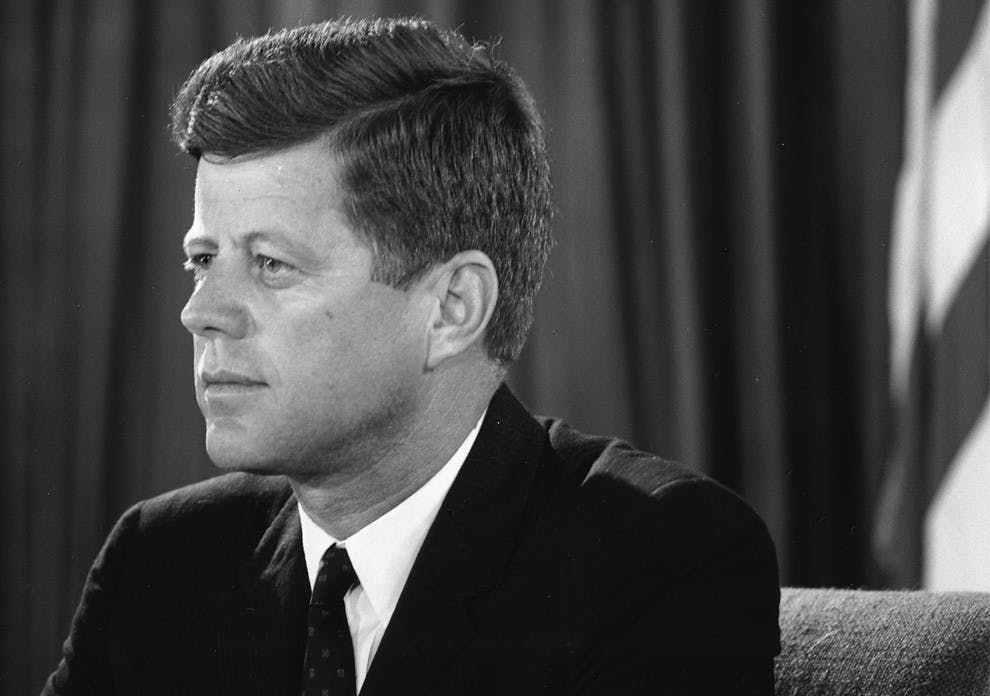
The Prompt: Why do you wish to come to Harvard?
JFK's response: The reasons that I have for wishing to go to Harvard are several. I feel that Harvard can give me a better background and a better liberal education than any other university. I have always wanted to go there, as I have felt that it is not just another college, but is a university with something definite to offer. Then too, I would like to go to the same college as my father. To be a "Harvard man" is an enviable distinction, and one that I sincerely hope I shall attain.

Our Thoughts on JFK's Essay
What he accomplishes.
He outlines his desire for a liberal education and identifies Harvard as the school in the best position to provide this service.
He flatters Harvard and separates it by claiming that it's not "just another college".
He expresses his long-held intention to attend Harvard.
He brings up his legacy status.
Where his essay falls short
While the writing is technically solid, this essay lacks a compelling story.
He never specifically identifies Harvard’s unique qualities, nor does he explain why those unique qualities would be a good match for him.
His family ties and desire to attend (which is really the heart of his application essay) are irrelevant; the admissions committee is uninterested in what its applicant wants. It’s far more interested in how an applicant might fit in and what that applicant might offer the college. JFK fails to consider both his fit and his potential contributions to Harvard.
Concluding thoughts
It’s quite clear that applying to college in the 1930s was quite different. JFK’s essay today likely wouldn’t slide at a less-selective state institution – and definitely wouldn’t be accepted at an enviable institution like Harvard.
This isn’t a reflection of JFK’s talents—clearly, he is a deeply intelligent man—but it does show how much applying to college has changed over the past few decades.
Read applications
Read the essays, activities, and awards that got them in. Read one for free !

Indiana Vargas
Harvard (+ 14 colleges)
Yale (+ 17 colleges)
Stanford (+ 11 colleges)
Related articles
What does a likely letter mean for college admissions?
If you're applying to college, you may have heard about (or even received) a likely letter. But what exactly is a likely letter? In this article, we'll discuss what these advantageous letters are and why colleges send them.
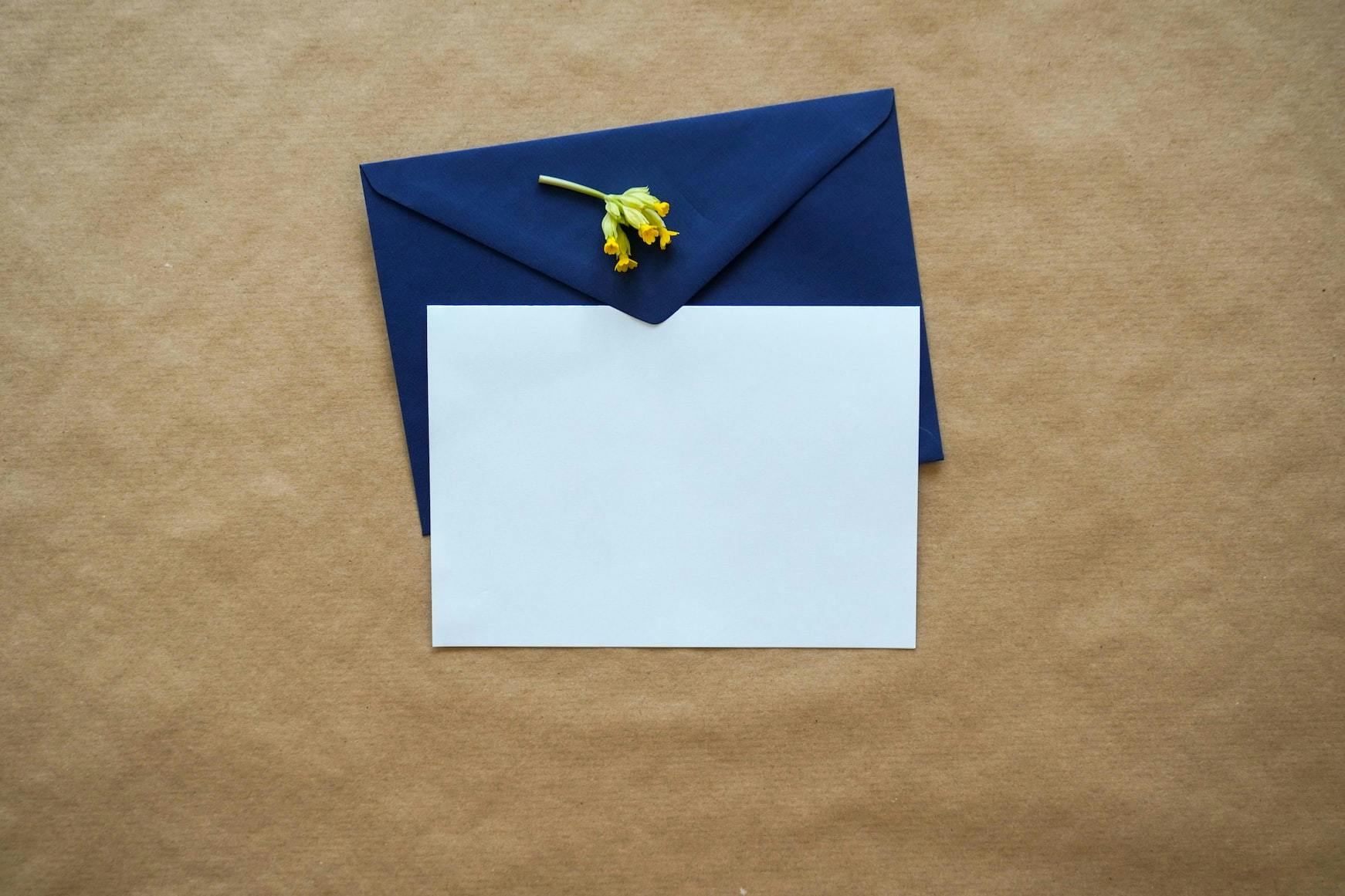
Discover the College Majors That Students Wish They Had (or Hadn't) Chosen
For years, your children were repeatedly asked, what do you want to be when you grow up? Often times, this response changes over time, and students change what they want to be. Here's what students would change about their initial pick!
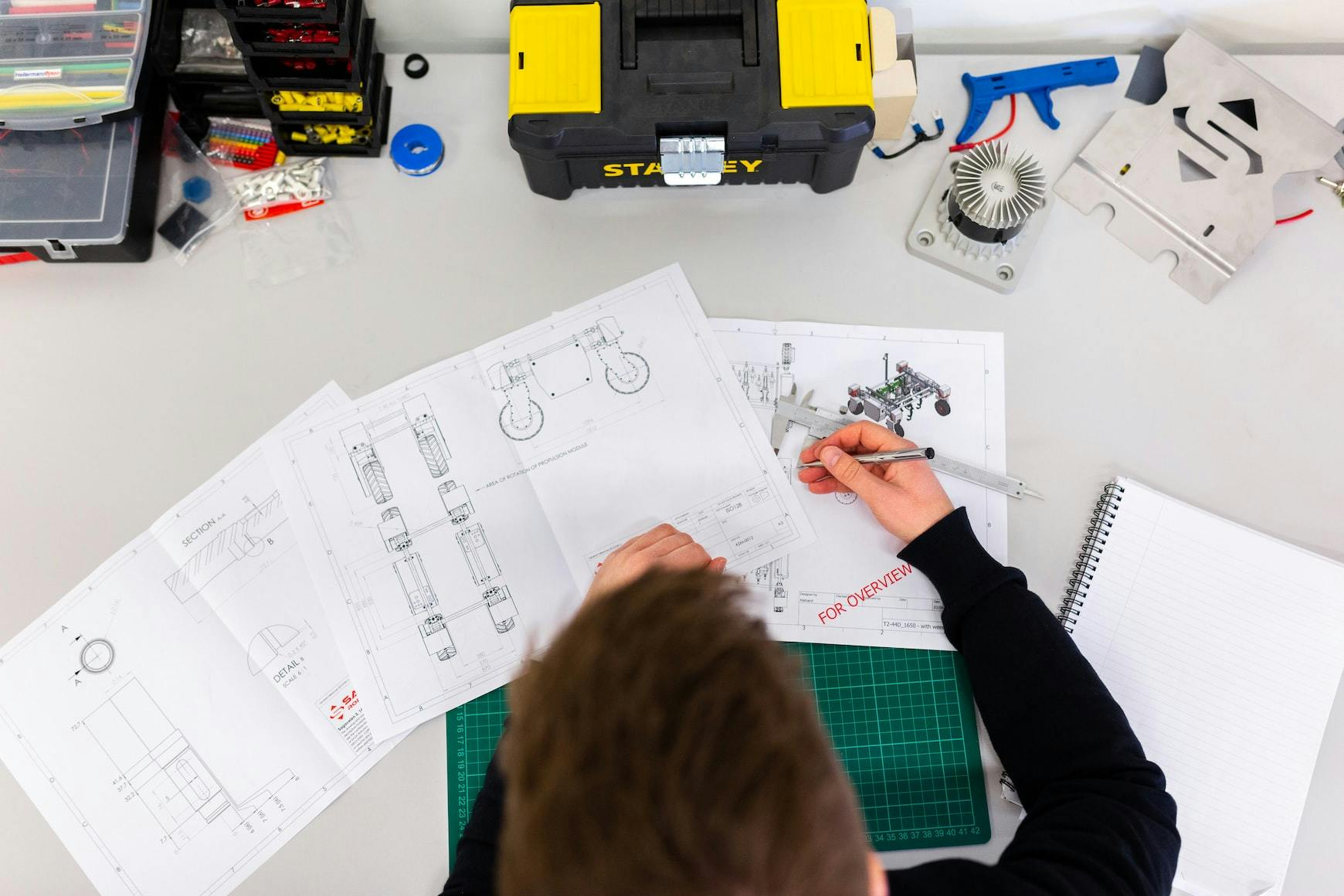
Featured Topics
Featured series.
A series of random questions answered by Harvard experts.
Explore the Gazette
Read the latest.

All the world’s a stage


Are humanities stuck in ivory tower? Should they be?

Courtney B. Vance, Angela Bassett honored as Artists of the Year
Harvard student John F. Kennedy studies at his desk ca. 1939. Credit: John F. Kennedy Library and Museum
Credit: John F. Kennedy Presidential Library and Museum
JFK speaks from his Harvard past
Colleen Walsh
Harvard Staff Writer
Centennial exhibit includes earliest known recording of future president’s voice
What did John F. Kennedy sound like as a vivacious 20-year-old, a young man who liked to balance his Harvard studies with ample amounts of sports and socializing, and whose first run for office was still almost 10 years away?
The iconic Hyannis-set home movies starring the tanned and toned Kennedy clan playing a game of touch football, or waving from the deck of a sailboat, have a prominent place in the nation’s collective memory. But the voice of the college-age JFK was lost to time — until now.
John F. Kennedy recording for public speaking class at Harvard, 1937
Harvard has just released what its archivists believe is the earliest voice recording of the future president, who, as it turns out, sounded a lot like a politician even as a young man. The restored recording is part of a new exhibit at the Harvard University Archives that explores Kennedy’s Harvard ties. It captures Kennedy delivering a 1937 speech about Supreme Court Justice Hugo Black for the College public speaking course “English F.”
“As far as we know, this is the earliest known recording of his voice in a research collection,” said archivist Megan Sniffin-Marinoff, who worked with the recording and helped curate the new exhibit “ JFK’s Harvard/Harvard’s JFK .” She said that the John F. Kennedy Presidential Library and Museum , in Boston, holds no recording earlier than a 1940 radio interview, as far as her staff is aware.
Kennedy’s familiar speaking pattern and Boston accent come through clearly on Harvard’s restored audio file. And though an occasional pause punctuated by an “uh” is scattered throughout his talk, a confident voice delivers his political message. In the 1-minute, 28-second clip, which Sniffin-Marinoff thinks was probably part of a longer address, Kennedy discusses Black’s appointment to the Supreme Court by President Franklin D. Roosevelt. The selection generated controversy after information about Black’s ties to the Ku Klux Klan came to light.
Harvard officials have been aware of the recording since it arrived several years ago as part of a collection of material related to Harvard professor Frederick Clifton Packard Jr. Packard taught the course in Harvard’s Holden Chapel and had been recording his students since the 1920s. (He also established the Harvard Vocarium, a project that produced recordings of famous poets including T.S. Eliot, Elizabeth Bishop, Wallace Stevens, and Ezra Pound.)
Image gallery
Harvard University Archives displays a selection of items that will be part of a new exhibit at the archives on JFK in honor of his 100th birthday. John F. Kennedy was the 35th President of the United States (1961-1963), the youngest man elected to the office. Kris Snibbe/Harvard Staff Photographer
President John F. Kennedy attends a Harvard football game in October 1963.
In a November 1964 letter from Jacqueline Kennedy to Harvard President Nathan M. Pusey, she declines an invitation to the unveiling of a portrait of her late husband.
The young Kennedy takes a dip.
Harvard biochemistry professor Paul Doty (left) with President John F. Kennedy and President of the Massachusetts Institute of Technology Jerome Wiesner, 1960. Both served on the President’s Council of Advisors on Science and Technology.
In the papers of Harvard physics professor and Nobel laureate Norman Ramsey, who was part of the National Research Council Committee on Ballistic Acoustics, is a copy of the audio recording of the JFK assassination picked up by a Dallas police officer’s microphone. As chair of the committee, Ramsey and a team of analysts determined the tape did not support theories of a second gunman.
The restored Kennedy recording is part of an ongoing effort to preserve the thousands of pieces of audio material housed at the University Archives, among them the hundreds of discs from Packard’s class. Helping to lead that effort is David Ackerman, the head of media preservation services at the Harvard Library, and likely the first person to hear the young Kennedy’s voice in 80 years.
“I was really struck by how recognizable his voice was, even through the noise,” said Ackerman, who transferred the recording from its original aluminum disc to a digital audio format before passing it to an engineer who cleaned up the clicks, pops, and crackles.
Though Kennedy is among several speakers on the two-sided disc, he is one of only two who discussed Black. His classmates preferred more mundane subjects, such as book collecting, sourdough, and how to find a wife.
For Ackerman, Kennedy’s choice of topic was an early indication of his aspirations. “This is why he became president. There was something in him that had him picking material like that.”
Kennedy scholars and enthusiasts will be happy to learn the recording is likely just the beginning. Sniffin-Marinoff said she is hopeful that as the Packard work continues archivists will find other Kennedy recordings. There could be additional discs containing the voices of both of John and of his older brother, Joseph P. Kennedy, who was also enrolled in Packard’s public-speaking class.
More like this
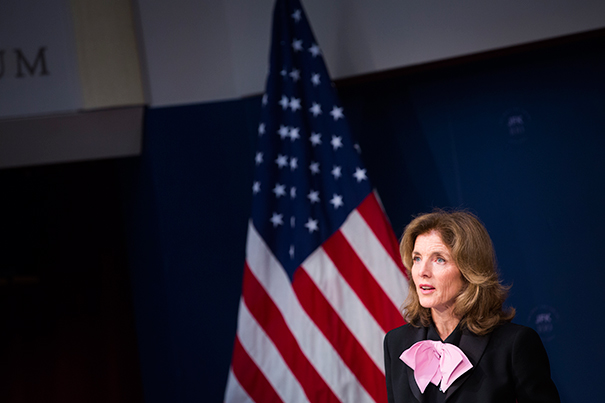
Thoughts on JFK at 100
“As a collection of recordings of early voices it’s really remarkable,” she said. “We are pretty sure there’s more Kennedy material.”
The Kennedy exhibit coincides with the 100th anniversary of the president’s birthday on May 29, which will be celebrated across the country in a series of memorials, ceremonies, and services, thanks in part to congressional support through the John F. Kennedy Centennial Commission.
The Harvard exhibit highlights material from Kennedy’s time as a student, as well as his connections to the University during his presidency, including his ties to the Harvard administration and to the many faculty members who played key roles in his administration. His Harvard legacy is symbolized most prominently by the renamed John F. Kennedy School of Government (originally the Harvard Graduate School of Public Administration) and the creation of its Institute of Politics in his honor.
Visitors will also be able to see the original copy of the future president’s 1956 Harvard Commencement speech, recently donated to the University by David M. Rubenstein, who will join the Harvard Corporation in July. In it, the future president called for a greater understanding between American intellectuals and politicians. Some considered the address an attempt by Kennedy to assuage critics who complained he hadn’t taken a tough enough stance against red-baiting Sen. Joseph McCarthy.
“It is regrettable that the gap between the intellectual and politician seems to be growing,” said Kennedy at the Tercentenary Theatre ceremony. “Instead of synthesis, clash and discord now characterizes the relations between the two groups much of the time.”
The speech was recently put into context by Harvard President Drew Faust, who contributed an essay about it for the book “A Vision for America: JFK in Words and Pictures,” edited by Stephen Kennedy Smith and Douglas Brinkley, also on display.
“Kennedy’s appeal for a recognition of the ‘mutual dependence’ of the worlds of politics and intellect, his call for a central role for learning and expertise, are all too timely today, at a moment when we seem to have forgotten the lessons of Sputnik and entered into what some have dubbed a ‘post-factual’ era in American public life,” Faust wrote.
Among the exhibit’s many photos is a shot of JFK as one of 49 in the Harvard football team’s picture from 1940, wedged between similarly stripe-shirted, broad-shouldered classmates. Nearby is an image of a smiling Kennedy amid a crowd watching a Harvard football game in October 1963, only a month before his death.
The exhibit also captures how one of the darkest chapters in the nation’s history — Kennedy’s assassination on Nov. 22, 1963 — resonated across campus. Included are telegrams urging Harvard President Nathan M. Pusey to postpone the Harvard-Yale football game scheduled for the following day, as well as correspondence between Pusey and the Kennedy family.
A January 1964 note from Jacqueline Kennedy thanks Pusey for sending her letters written by students “throughout the world on the death of the President.” In a letter from November 1964, she declines his invitation to an unveiling of a portrait of her late husband. She wrote: “Later on I will want to see the portrait, but right now it would be a little too painful an experience for me.”
Other manuscripts point to the role Harvard faculty played in trying to unravel theories swirling around the assassination. In the papers of former physics professor and Nobel laureate Norman Ramsey, who was part of the National Research Council Committee on Ballistic Acoustics, is a copy of the audio recording of the assassination picked up by a Dallas police officer’s microphone. As chair of the committee, Ramsey and a team of analysts determined the tape did not support theories of a second gunman.
“The material offers up a deeper look at what happens at Harvard in the wake of his death, and that’s represented in the collection here,” said Sniffin-Marinoff. “But there’s so much more in the archives’ collection to remind us about his life and his Harvard connections.”
Share this article
You might like.
Richard Sennett urges revitalizing public life, spaces, politics by creating spaces that engage imagination

Two literature scholars wrestle over whether and how professors can engage with pressing political, social issues of day

Cultural Rhythms’ weeklong celebration highlights student performers, food, and fashion
Harvard announces return to required testing
Leading researchers cite strong evidence that testing expands opportunity
Good genes are nice, but joy is better
Harvard study, almost 80 years old, has proved that embracing community helps us live longer, and be happier
Women rarely die from heart problems, right? Ask Paula.
New book traces how medical establishment’s sexism, focus on men over centuries continues to endanger women’s health, lives
Application FAQs: Essays

Essays are a critical component of your application. They allow you to tell the Admissions Committee more about your personal history and experiences, professional aspirations, and commitment to public service. We want to know who you are and why you are interested in pursuing a master’s degree at Harvard Kennedy School—and essays are the best way for us to gather this information.
Below, you’ll find answers to some of the most frequently asked questions we receive about essays.
What essays are required as part of the application for admission?

If you are applying to a joint or concurrent degree program, you will need to submit essays for the HKS degree program you are applying to, as well as the joint or concurrent degree program essay .
How strict are the word limits?
Our application will not prevent you from submitting essays that surpass the stated word limits, but we strongly recommend that you stay as close to the word limits as possible. Being concise is important in policy writing, and this is an opportunity to demonstrate that ability to the Admissions Committee.
Is there a particular format I should follow?
Essays should be typed, uploaded, and labeled with the appropriate topic. We advise that you upload all documents as PDFs. We don’t have a font preference, but your essays should be easy to read.
Are there any sample essays I can review as I prepare to write my essays?
We want to ensure that the essays you are submitting are wholly your own and authentic to your experiences. For that reason, we do not have sample essays to provide you. We encourage you to:
- Be authentic and use your own voice.
- Don’t wait until the last minute to start working on your essays—allow plenty of time for thorough editing and proofreading.
- Answer the question that is being asked.
Can I use an AI tool to assist in writing my essays?
All essays must be truthful and based on authentic, firsthand experiences, without the use of generative AI.
Can an admissions representative from HKS proofread my essay for me?
No, we are unable to review essays before the formal application review process.
Should I submit an optional essay?
On the Essay section of the application, you will see an opportunity to upload an optional essay. If there is anything you would like the Admissions Committee to know about your academic, professional, or personal background that is not otherwise addressed in your application, you can use the optional essay to provide this context.
The optional essay is helpful to address:
- Gaps in your résumé or professional background
- Major changes in your career trajectory
- Inconsistent academic performance
- Perceived weaknesses in your application
If you are submitting an optional essay, be careful not to make excuses but instead provide context and focus on growth and learning.
Most applicants do not submit an optional essay, so do not feel obligated to submit an optional essay if there is nothing you feel needs to be addressed.

Three tips for reapplicants
What All Of The 3.6% Admitted Students At Harvard Have In Common This Year
- Share to Facebook
- Share to Twitter
- Share to Linkedin
Harvard College
Every year, tens of thousands of students from around the world apply to Harvard University in the hopes of attending one of the nation’s most prestigious universities. To write that receiving a coveted letter of admission is challenging is a gross understatement—only 3.59% of Harvard hopefuls were admitted during the 2023-24 application cycle. Earning acceptance in the cutthroat admissions landscape requires strategy and planning. While Harvard's admitted class is composed of a diverse group of students with widely varied interests and backgrounds, there are a few guiding commonalities that unite them.
As they develop their interests and build their applicant profiles, Ivy League hopefuls should keep in mind that successful students who are bound for elite institutions showcase:
1. Academic Prowess
While academic skills are not the sum total of what a student needs to get into Harvard, they are a foundational component of a successful application. Students can demonstrate their preparedness for the rigors of Harvard academics in two ways—through a strong GPA (particularly in classes related to their intended major) and through standardized test scores. Dartmouth notes in their announcement of their reinstated standardized testing policy that students’ perception of what admissions officers look for in scores is strongly misunderstood. The press release states: “The absence of such scores underscores longstanding misperceptions about what represents a "high" or a "low" score; those definitions are not binary. A score that falls below our class mean but several hundred points above the mean at the student’s school is "high" and, as such, it has value as one factor among many in our holistic assessment.” While strong candidates typically submit scores that match or exceed an institution’s published average for admitted students, this is not always the case, and students should be mindful that their scores will be evaluated within the larger context of their application.
2. Singular Passions
Although a stellar academic record and impressive standardized test scores are critical for admission, they are merely the foundation of a successful Ivy League application. Harvard and other top colleges seek students with more than great transcripts—students who not only excel academically but who also possess a guiding passion, often one that they have mobilized in service of their communities. As Harvard’s admissions website states : “There is no formula for gaining admission to Harvard. Academic accomplishment in high school is important, but the Admissions Committee also considers many other criteria, such as community involvement, leadership and distinction in extracurricular activities, and personal qualities and character.” Reflecting a passion in an applicant profile requires strategy, motivation, and—perhaps most importantly—time.
While students should use their freshman and sophomore years to explore their interests and get involved in clubs and organizations on campus, it is critical that they do so with the intention of discovering their core passions and honing their involvements by junior year. Rather than spreading themselves thin by pursuing a multitude of interests, admitted students at top schools demonstrate deep engagement and leadership in a particular area of interest, aiming to become specialists in their field. Whether it's a passion for scientific research, a commitment to social justice advocacy, a love for the performing arts, or a dedication to community service, focused pursuits allow applicants to showcase their talents, accomplishments, and potential contributions to their future college community.
Best High-Yield Savings Accounts Of 2024
Best 5% interest savings accounts of 2024, 3. demonstrable impact on their communities.
Beyond mere interest or involvement, successful Harvard applicants demonstrate tangible impact in their communities through their endeavors. Demonstrated impact is a powerful indicator of an applicant's drive, initiative, and potential for future success, and it illustrates to admissions committees the kind of community member the student will be on campus. Therefore, students should not only strategize for discovering and pursuing their core passions, but they should also be intentional about crafting a compelling and cohesive narrative demonstrating those passions through their Activities List, essays, and letters of recommendation .
The small percentage of students who earn admission to Harvard are not only academically gifted—they are deeply engaged, committed, and impactful. By telling a cohesive narrative about their grounding passions in their applications, students can stand out to admissions officers and boost their chances of admission to their dream schools.

- Editorial Standards
- Reprints & Permissions
Final thesis: Harvard copy
About folder.
Middle East Dialogues - A Conversation with Bret Stephens

Description
Join Professor Tarek Masoud for a conversation with Bret Stephens , New York Times opinion columnist and founder and editor-in-chief of SAPIR, on the war in Gaza, U.S. foreign policy in the Middle East, and free speech on college campuses.
This event is part of the Middle East Initiative's "Middle East Dialogues," a series of frank, open, and probing encounters with vital and varied perspectives on the current conflict, its causes, and the prospects for peace and progress in the region.
Please register with a valid Harvard email address to attend in-person. All JFK Jr. Forums are also livestreamed on our YouTube channel .
Accessibility
The IOP encourages persons with disabilities to participate in our programs. If you have questions about accommodations or the physical access provided, please contact 617-495-1360 or [email protected] in advance of the event. The Forum is currently closed to those without a Harvard ID, and RSVPs are required for in-person attendance.
Event Details
RSVP with a valid Harvard email address (in-person attendance) Date: Monday, April 29, 2024 Time: 6:00pm EST Where: JFK Jr. Forum, 79 John F. Kennedy St., Cambridge, MA 02138 RSVP for In-Person Seat
Find More IOP Events

- Asia Center Council
- Asia Center Steering Committee
- Visiting Scholars, Fellows, Associates
- Graduate Student Associates
- Upcoming Events
- Past Events
- Seminar Series
- Asian Diasporas
- Disaster Response and Resilience
- Responses to Refugee Crises
- Southeast Asia
- Transnational and Transregional Research
- Harvard-Yale Southeast Asia Graduate Conference 2024
- Language Instruction
- Thai Studies Program
- Student Funding Opportunities
- Information for Authors
- Addendums and Book Resources
The China Conference
XIE Feng, Ambassador Extraordinary and Plenipotentiary of The People's Republic of China to the United States of America Graham Allison, Douglas Dillon Professor of Government and former Dean at JFK School of Government Xue Lan, Dean of Schwarzman College, Tsinghua University Sir Daniel Alexander, VP of Policy and Strategy, Asian Infrastructure Investment Bank
Harvard University's Asia-Related Resources
Harvard University enjoys a wealth of resources across regions and disciplines supporting the study of Asia, including the centers & institutes, departments & degree programs, and libraries & collections listed below. For additional details on these and other resources, including people, events, courses, and publications, please visit the "Explore Asia at Harvard" feature on this site.

IMAGES
VIDEO
COMMENTS
JFK's Very Revealing Harvard Application Essay. At 17 years old, the future president seemed to understand that the value of an elite education is in the status it offers. John F. Kennedy stands ...
A 17-year-old John F. Kennedy wrote a five-sentence college admissions essay to Harvard University -- and got in, of course. Hulton Archive/Getty Images
Here's John F. Kennedy's personal essay from his Harvard University application. ... Without a doubt, John F. Kennedy is one of Harvard University's most accomplished and impressive graduates.
John F. Kennedy's 1935 Harvard essay seeking admission to Harvard mentions his wealthy father as one of the reasons he thinks he should be admitted. ... attends Harvard University for an overseers ...
JFK's 1935 Harvard University application essay has hit the Internet thanks to the Kennedy Presidential Library and Museum. The scanned document gives us a look at Kennedy's grades, academic ...
After John F. Kennedy's grandson Jack Kennedy Schlossberg graduated with a dual degree from Harvard, JFK's own Harvard admissions essay went viral.The 35th president of the United States graduated ...
How did John F. Kennedy persuade the Harvard admissions committee to accept him in 1935? Read his brief personal essay, which reveals his ambition, resilience, and vision for the future. This article from Harvard Magazine also explores the context and impact of JFK's application, and compares it with other famous Harvard alumni.
Date (s) of Materials. 1 June 1933-28 August 1936. Folder Description. This folder contains items concerning President Kennedy's admission to Harvard University, including applications for the College Entrance Examination Board and admission to Harvard College, character and academic references, and correspondence between the admissions offices ...
JFK's Harvard application (with essay) and other school records. By Valerie Strauss. November 20, 2013 at 12:20 p.m. EST. The 50th anniversary of the assassination of President John F. Kennedy ...
A 1935 Harvard University entrance essay written by a then 17-year-old John F. Kennedy is again making the rounds online, this time going viral on social media for what critics say is an ...
John F. Kennedy endeavored to be a "Harvard Man," just like his father. He wrote as much as a 17-year-old in 1935 in his rather succinct essay to Harvard College, a copy of which resurfaced on ...
AP PhotoWithout a doubt, John F. Kennedy is one of Harvard University's most accomplished and impressive alumni. However, the former POTUS was not the best
It's quite clear that applying to college in the 1930s was quite different. JFK's essay today likely wouldn't slide at a less-selective state institution - and definitely wouldn't be accepted at an enviable institution like Harvard. This isn't a reflection of JFK's talents—clearly, he is a deeply intelligent man—but it does ...
April 23, 1935. John F. Kennedy. What did JFK do in his essay? He establishes his interest in getting a liberal education, and established Harvard as the school strongest position to deliver this service. He flatters Harvard and differentiates it by saying that it's not "just another college". He states his long held desire to go to Harvard.
JFK Essay. The Harvard Kennedy School motto, echoing the President for whom the School is named, is "Ask what you can do." Please share with the Admissions Committee your plans to create positive change through your public leadership and service. (500 word limit) Two-Year MPA Essay
New biography aims to chronicle a complex life amid a pivotal time for a nation. One of the revelations about John F. Kennedy in Fredrik Logevall's new biography, "JFK: Coming of Age in the American Century, 1917‒1956," is that the man was an excellent letter-writer and diarist. The Laurence D. Belfer Professor of International Affairs ...
Harvard University Archives displays a selection of items that will be part of a new exhibit at the archives on JFK in honor of his 100th birthday. John F. Kennedy was the 35th President of the United States (1961-1963), the youngest man elected to the office. Kris Snibbe/Harvard Staff Photographer
This was JFK's Harvard application essay, compare it to the personal statements we all had to write… General Share Add a Comment. Sort by: ... from college essays and scholarships to SAT/ACT test prep, career guidance, and more. Members Online. Advice to Juniors from a Pre-Frosh
JFK's Very Revealing Harvard Application Essay. John F. Kennedy is one of the most mythologized figures in contemporary American history. At age 17, though, he was just a kid trying to get into college (a kid with a wealthy, famous father, of course). The Kennedy Presidential Library and Museum has a digitized version of Kennedy's 1935 Harvard ...
Essays are a critical component of your application. They allow you to tell the Admissions Committee more about your personal history and experiences, professional aspirations, and commitment to public service. We want to know who you are and why you are interested in pursuing a master's degree at Harvard Kennedy School—and essays are the best way for us to gather this information.
All JFK Jr. Forums are publicly livestreamed on our YouTube channel., powered by Localist. Secretary Ray Mabus, Former Secretary of the Navy and US Ambassador to Saudi Arabia, will join us for a conversation focused on the latest developments in the war between Russia and Ukraine, America's ongoing relationship with China, the future of the ...
1. Academic Prowess. While academic skills are not the sum total of what a student needs to get into Harvard, they are a foundational component of a successful application.
If you have questions about accommodations or the physical access provided, please contact 617-495-1360 or [email protected] in advance of the event. The Forum is currently closed to those without a Harvard ID, and RSVPs are required for in-person attendance. Wednesday, April 24, 2024. JFK Jr. Forum, 79 John F. Kennedy St., Cambridge, MA ...
Join us for a conversation between Oscar-nominated filmmaker and screenwriter Ava DuVernay and Professor Khalil Gibran Muhammad.DuVernay's latest film 'Origin' is a powerful adaptation of Isabel Wilkerson's book 'Caste', taking a broad look at underlying systems of social hierarchies. It draws connections between race in the United States, the persecution of Jews in Nazi Germany ...
October 28, 2023 10:46:23 AM EDT. This folder contains an electrostatic copy of the final version of John F. Kennedy's Harvard University senior thesis, Appeasement at Munich: The Inevitable Result of the Slowness of Conversion of the British Democracy from a Disarmament to a Rearmament Policy.
Join Professor Tarek Masoud for a conversation with Bret Stephens, New York Times opinion columnist and founder and editor-in-chief of SAPIR, on the war in Gaza, U.S. foreign policy in the Middle East, and free speech on college campuses.This event is part of the Middle East Initiative's "Middle East Dialogues," a series of frank, open, and probing encounters with vital and varied perspectives ...
Fri, Apr 19 2024, 4 - 5:30pm. View all events. XIE Feng, Ambassador Extraordinary and Plenipotentiary of The People's Republic of China to the United States of AmericaGraham Allison, Douglas Dillon Professor of Government and former Dean at JFK School of GovernmentXue Lan, Dean of Schwarzman College, Tsinghua UniversitySir Daniel Alexander, VP ...
Centralized events calendar for Harvard College. Join us for a conversation between Oscar-nominated filmmaker and screenwriter Ava DuVernay and Professor Khalil Gibran Muhammad on April 24 at 7:00-8:00PM ET at the Harvard Kennedy School. ... All JFK Jr. Forums are publicly livestreamed on our YouTube channel., powered by Localist.
The discussion will be moderated by Professor Emmanual Akyeampong, who recently served as Faculty Director for the Harvard University Center for African Studies. Co-sponsors: Center for African Studies, Belfer Center for Science and International Affairs Please register with a valid Harvard email address to attend in-person.